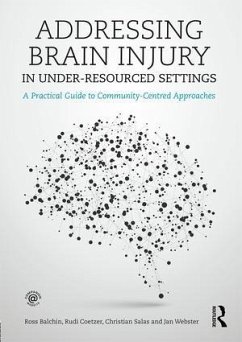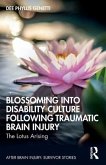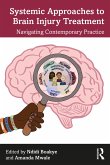Ross Balchin (South Africa University of Cape Town), Rudi Coetzer (Colwyn Bay Hospital North Wales Brain Injury Service, Christian Salas (Head Forward Centre, Manchester, UK)
Addressing Brain Injury in Under-Resourced Settings
A Practical Guide to Community-Centred Approaches
Ross Balchin (South Africa University of Cape Town), Rudi Coetzer (Colwyn Bay Hospital North Wales Brain Injury Service, Christian Salas (Head Forward Centre, Manchester, UK)
Addressing Brain Injury in Under-Resourced Settings
A Practical Guide to Community-Centred Approaches
- Broschiertes Buch
- Merkliste
- Auf die Merkliste
- Bewerten Bewerten
- Teilen
- Produkt teilen
- Produkterinnerung
- Produkterinnerung
Many of the worldâ s population have no access to appropriate diagnostic, neurorehabilitative or support services following brain injury. Addressing Brain Injury in Under-Resourced Settings tackles this unacceptable gap, empowering readers in the provision of basic care, education and support for patients and their families.
Andere Kunden interessierten sich auch für
![The Reality of Brain Injury The Reality of Brain Injury]() Andrew TillyardThe Reality of Brain Injury25,99 €
Andrew TillyardThe Reality of Brain Injury25,99 €![The Reality of Brain Injury The Reality of Brain Injury]() Andrew TillyardThe Reality of Brain Injury142,99 €
Andrew TillyardThe Reality of Brain Injury142,99 €![Blossoming Into Disability Culture Following Traumatic Brain Injury Blossoming Into Disability Culture Following Traumatic Brain Injury]() Dee Phyllis GenettiBlossoming Into Disability Culture Following Traumatic Brain Injury33,99 €
Dee Phyllis GenettiBlossoming Into Disability Culture Following Traumatic Brain Injury33,99 €![Insomnia and Fatigue after Traumatic Brain Injury Insomnia and Fatigue after Traumatic Brain Injury]() Marie-Christine OuelletInsomnia and Fatigue after Traumatic Brain Injury42,99 €
Marie-Christine OuelletInsomnia and Fatigue after Traumatic Brain Injury42,99 €![Systemic Approaches to Brain Injury Treatment Systemic Approaches to Brain Injury Treatment]() Systemic Approaches to Brain Injury Treatment37,99 €
Systemic Approaches to Brain Injury Treatment37,99 €![Managing Challenging Behaviour Following Acquired Brain Injury Managing Challenging Behaviour Following Acquired Brain Injury]() Managing Challenging Behaviour Following Acquired Brain Injury36,99 €
Managing Challenging Behaviour Following Acquired Brain Injury36,99 €![Embracing Hope After Traumatic Brain Injury Embracing Hope After Traumatic Brain Injury]() Michael S. ArthurEmbracing Hope After Traumatic Brain Injury25,99 €
Michael S. ArthurEmbracing Hope After Traumatic Brain Injury25,99 €-
-
-
Many of the worldâ s population have no access to appropriate diagnostic, neurorehabilitative or support services following brain injury. Addressing Brain Injury in Under-Resourced Settings tackles this unacceptable gap, empowering readers in the provision of basic care, education and support for patients and their families.
Hinweis: Dieser Artikel kann nur an eine deutsche Lieferadresse ausgeliefert werden.
Hinweis: Dieser Artikel kann nur an eine deutsche Lieferadresse ausgeliefert werden.
Produktdetails
- Produktdetails
- Verlag: Taylor & Francis Ltd
- Seitenzahl: 340
- Erscheinungstermin: 10. Oktober 2017
- Englisch
- Abmessung: 174mm x 245mm x 19mm
- Gewicht: 644g
- ISBN-13: 9781138903401
- ISBN-10: 113890340X
- Artikelnr.: 48822880
- Herstellerkennzeichnung
- Libri GmbH
- Europaallee 1
- 36244 Bad Hersfeld
- gpsr@libri.de
- Verlag: Taylor & Francis Ltd
- Seitenzahl: 340
- Erscheinungstermin: 10. Oktober 2017
- Englisch
- Abmessung: 174mm x 245mm x 19mm
- Gewicht: 644g
- ISBN-13: 9781138903401
- ISBN-10: 113890340X
- Artikelnr.: 48822880
- Herstellerkennzeichnung
- Libri GmbH
- Europaallee 1
- 36244 Bad Hersfeld
- gpsr@libri.de
Ross Balchin is a Clinical Neuropsychologist based at Groote Schuur Hospital in Cape Town, South Africa, and an Honorary Research Associate in the Division of Neurosurgery at the University of Cape Town. Dr Balchin also works with the Neuropsychoanalysis Foundation in New York as an independent contractor. He has formerly held both the National Research Foundation NPPD and the Claude Leon Foundation postdoctoral fellowships. Rudi Coetzer is a Consultant Neuropsychologist, and Head of the North Wales Brain Injury Service, Betsi Cadwaladr University Health Board NHS Wales. He is an Honorary Senior Lecturer in Clinical Neuropsychology in the School of Psychology, Bangor University. Dr Coetzer is on the British Psychological Society Division of Neuropsychology Specialist Register. Christian Salas is a Clinical Neuropsychologist and a Psychoanalytic Psychotherapist. He is a researcher at the Cognitive and Social Neuroscience Laboratory (Universidad Diego Portales) and Training Teacher at the Dynamic Psychotherapy Unit (J.H. Barak Psychiatric Institute), both in Santiago, Chile. Jan Webster is an independent organization development consultant in the international charity sector. She founded The ComaCARE Trust in 2005 at Groote Schuur Hospital in Cape Town and served as its director for ten years, during which time she started its HeadsUP! community brain injury rehabilitation programme. She has successfully promoted public brain awareness through cofounding an official World Design Capital 2014 project entitled Brainstorm the City. In 2007, Jan became an Ashoka Fellow in recognition of her social entrepreneurship.
Section 1: Under-resourced Settings: The Global Reality
1: Introduction: Brain Injury in the global context
2: Communities and cross-cultural realities
Section 2: Understanding Brain Injury and Working with its consequences
3: How the Brain works
4: The Injured Brain: Trauma and Diseases
5: How to recognise whether a patient is orientated
6: How to recognise and deal with memory problems
7: How to recognise and deal with language problems
8: How to recognise and deal with spatial cognition problems
9: How to recognise and deal with executive control problems
10: How to recognise and deal with mood problems, emotional dysregulation
and other psychiatric presentations
11: How to recognise and deal with socio-emotional problems
12: How to recognise and deal with sleep problems
13: Understanding patients' medications and medical investigations
Section 3: How to Provide Services in Under-resourced Settings
14: Patients' Needs: The continuum of care
15: Emotional adjustment to brain injury: How to facilitate the process
16: How to educate and train community volunteers in the basic principles
of neuropsychological rehabilitation
17: Transferable technology: Helpful tools
18: Working with NPO's/ NGOs, Charities and other Global Organisations
19: How to initiate and develop community-based projects and programmes
20: Community-based public health projects for preventing brain injury
21: Sustainability and Activism
1: Introduction: Brain Injury in the global context
2: Communities and cross-cultural realities
Section 2: Understanding Brain Injury and Working with its consequences
3: How the Brain works
4: The Injured Brain: Trauma and Diseases
5: How to recognise whether a patient is orientated
6: How to recognise and deal with memory problems
7: How to recognise and deal with language problems
8: How to recognise and deal with spatial cognition problems
9: How to recognise and deal with executive control problems
10: How to recognise and deal with mood problems, emotional dysregulation
and other psychiatric presentations
11: How to recognise and deal with socio-emotional problems
12: How to recognise and deal with sleep problems
13: Understanding patients' medications and medical investigations
Section 3: How to Provide Services in Under-resourced Settings
14: Patients' Needs: The continuum of care
15: Emotional adjustment to brain injury: How to facilitate the process
16: How to educate and train community volunteers in the basic principles
of neuropsychological rehabilitation
17: Transferable technology: Helpful tools
18: Working with NPO's/ NGOs, Charities and other Global Organisations
19: How to initiate and develop community-based projects and programmes
20: Community-based public health projects for preventing brain injury
21: Sustainability and Activism
Section 1: Under-resourced Settings: The Global Reality
1: Introduction: Brain Injury in the global context
2: Communities and cross-cultural realities
Section 2: Understanding Brain Injury and Working with its consequences
3: How the Brain works
4: The Injured Brain: Trauma and Diseases
5: How to recognise whether a patient is orientated
6: How to recognise and deal with memory problems
7: How to recognise and deal with language problems
8: How to recognise and deal with spatial cognition problems
9: How to recognise and deal with executive control problems
10: How to recognise and deal with mood problems, emotional dysregulation
and other psychiatric presentations
11: How to recognise and deal with socio-emotional problems
12: How to recognise and deal with sleep problems
13: Understanding patients' medications and medical investigations
Section 3: How to Provide Services in Under-resourced Settings
14: Patients' Needs: The continuum of care
15: Emotional adjustment to brain injury: How to facilitate the process
16: How to educate and train community volunteers in the basic principles
of neuropsychological rehabilitation
17: Transferable technology: Helpful tools
18: Working with NPO's/ NGOs, Charities and other Global Organisations
19: How to initiate and develop community-based projects and programmes
20: Community-based public health projects for preventing brain injury
21: Sustainability and Activism
1: Introduction: Brain Injury in the global context
2: Communities and cross-cultural realities
Section 2: Understanding Brain Injury and Working with its consequences
3: How the Brain works
4: The Injured Brain: Trauma and Diseases
5: How to recognise whether a patient is orientated
6: How to recognise and deal with memory problems
7: How to recognise and deal with language problems
8: How to recognise and deal with spatial cognition problems
9: How to recognise and deal with executive control problems
10: How to recognise and deal with mood problems, emotional dysregulation
and other psychiatric presentations
11: How to recognise and deal with socio-emotional problems
12: How to recognise and deal with sleep problems
13: Understanding patients' medications and medical investigations
Section 3: How to Provide Services in Under-resourced Settings
14: Patients' Needs: The continuum of care
15: Emotional adjustment to brain injury: How to facilitate the process
16: How to educate and train community volunteers in the basic principles
of neuropsychological rehabilitation
17: Transferable technology: Helpful tools
18: Working with NPO's/ NGOs, Charities and other Global Organisations
19: How to initiate and develop community-based projects and programmes
20: Community-based public health projects for preventing brain injury
21: Sustainability and Activism








